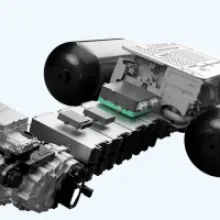SHERIDAN, WYOMING – Mar 6, 2025- In a groundbreaking initiative poised to revolutionize the electric vehicle (EV) industry, UK-based fuel cell technology developer Viritech has launched a study to explore the integration of a hydrogen fuel cell range extender (REX) in both on-and-off highway electric vehicles. This project, funded by a grant from the Department for Business and Trade (DBT) through the Advanced Propulsion Centre (APC) and Niche Vehicle Network, is focused on deploying portable fuel cells to enhance vehicle mobility in niche applications.
The adoption of fuel cells as range extenders has traditionally been limited to medium and heavy commercial vehicles. Viritech, however, is pushing the boundaries by assessing the feasibility of these systems in L-Cat vehicles, which could dramatically expand their usability and functionality. The main goal is to address the limitations faced by battery electric vehicles, especially last-mile delivery vehicles that often struggle with range issues due to extreme weather conditions, urban congestion, and varied terrain.
Larger batteries can counteract some of these challenges but come with drawbacks such as increased weight, reduced payload capacity, and potential regulatory non-compliance. Viritech's approach combines cost-effective, portable fuel cells with existing battery packs to create a novel, commercially viable zero-emissions solution. This initiative not only aims to enhance the operational range and efficiency of EVs but also opens up new possibilities for fuel cell technology in the broader automotive sector.
Timothy Lyons, founder and CEO of Viritech, expressed his enthusiasm for the project, stating, “Viritech is delighted to be undertaking this project and exploring the potential to accelerate the decarbonization of a notoriously challenging segment of the automotive sector. The support of the Department for Business and Trade, the Advanced Propulsion Centre, and The Niche Vehicle Network is vital to British technology companies such as Viritech, enabling us to redefine the art of the possible in solving the challenges of zero-emissions mobility.”
As Viritech moves forward with this pioneering study, it is actively seeking collaboration with L-Cat vehicle OEMs and last-mile delivery operators. The goal is to tailor the FC REX powertrain to meet specific operational needs, thereby not only enhancing vehicle performance but also contributing significantly to the global transition towards zero-emissions mobility.
This innovative approach underscores the potential of hydrogen fuel cell technology as a critical component in the evolution of the automotive industry, particularly in niche markets that require specialized solutions. By successfully integrating a fuel cell range extender into electric vehicles, Viritech could fundamentally alter the landscape of vehicle design and functionality, paving the way for a cleaner, more sustainable future in transportation.
As the project progresses, the insights gained from this study could serve as a blueprint for similar advancements across the automotive industry, further supporting the shift towards sustainable and efficient vehicle technologies. With the backing of significant industry partners and a clear vision for the future, Viritech is well-positioned to lead the charge in transforming the way vehicles are powered, ensuring a greener tomorrow.
